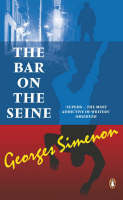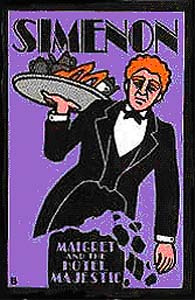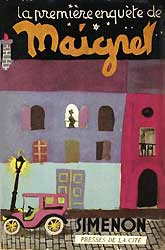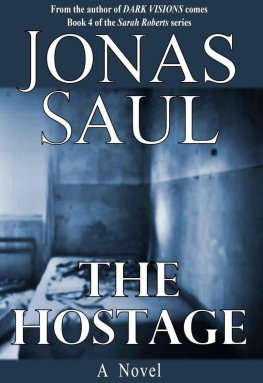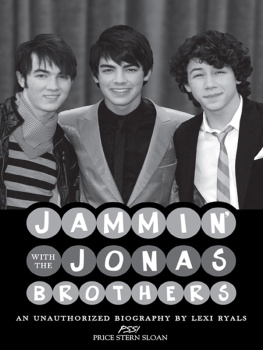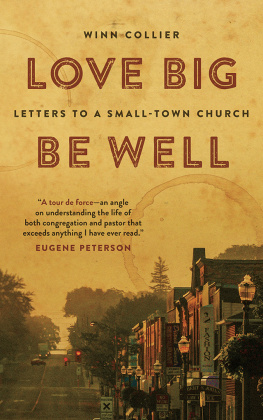THE LITTLE MAN FROM ARCHANGEL
Copyright 1957 by Georges Simenon
Le Petit Homme d'Arkhangelsk was first published in France in 1957 and in Great Britain in 1957.
Translated from the French by Nigel Ryan
THE LITTLE MAN FROM ARCHANGEL
CONTENTS
I
H E made the mistake of telling a lie. He felt it intuitively the moment he opened his mouth to reply to Fernand Le Bouc, and it was actually from timidity, lack of sangfroid, that he did not alter the words which came to his lips. What he said was: 'She's gone to Bourges.'
Le Bouc asked, as he rinsed a glass behind his counter: 'Is La Loute still there?'
He replied without looking at him: 'I suppose so.'
It was ten o'clock in the morning, and as it was Thursday, the market was in full swing. In Fernand's small bistro, almost entirely enclosed in glass, on the corner of the Impasse des Trois-Rois, five or six men were standing at the bar. At that moment it didn't matter who was there, but this was to become important, and Jonas Milk was later to try to identify each face.
Near him was Gaston Ancel, the red-faced butcher, in his bloodstained apron, who came in three or four times a morning for a quick glass of white wine and who had a particular way of wiping his mouth afterwards. He was constantly cracking jokes in his loud voice and, in his butcher's shop, used to tease the customers, while at the cash desk Madame Ancel apologized for her husband's bad language.
With Ancel, a cup of coffee in his hand, stood Benaiche, the policeman on duty at the market, known to everybody as Julien.
The little old man with the greenish coat and trembling hands must have spent the night outside, as he did most of the time. Nobody knew who he was, nor where he came from, but they had got used to him and he had ended up by becoming part of the surroundings.
Who were the others? An electrician whom Jonas didn't know, with someone whose pocket was stuffed with pencils, a foreman or the boss of some small business.
He never recalled the sixth, but he could have sworn that there was a figure between himself and the window.
At the tables behind the men, three or four women vegetable vendors dressed in black were eating sandwiches.
It was the same atmosphere as on any market morning, that is to say, on Tuesdays, Thursdays and Saturdays, That Thursday a clear and warm June sun beat down full on the fronts of the houses, while under the huge roof of the covered-in market the people were bustling round the hampers and stalls in a bluish half-light.
Jonas had been anxious to avoid any hitch in his routine. As ten o'clock approached, his shop being free of customers, he had walked the five yards of pavement which separated him from Fernand's bistro, and from there, through the windows, he could watch the boxes of second-hand books arrayed against his shop front.
He could quite well not have opened his mouth. Some of them, at Fernand's, used to go up to the bar without a word, for it was known in advance what they were going to have. For him it was invariably, an espresso coffee.
Even so he said, possibly out of humility, or from a need to be precise: 'An espresso coffee.'
Practically everyone knew everyone else, and sometimes they didn't say good morning to each other, thinking they had already met earlier in the day.
Fernand Le Bouc, for example, was on his feet from three o'clock in the morning for the arrival of the lorries, and Ancel, the butcher, who awoke at five, had already been in at least twice to the bar.
The shops were clustered round the slate roof of the market, which had no walls and was bordered by a gutter littered with broken crates and packing-cases, rotting oranges, and trampled wood shavings.
The housewives who trod in this debris had no idea that the square, before their arrival, long before they were awake, had already seen, amidst the noise of heavy lorries and the smell of diesel oil, several hours of feverish existence.
Jonas was watching the coffee falling drop by drop from the tiny chromium tap into the brown cup. He had another habit: before being handed his coffee he would unwrap the transparent paper containing his two pieces of sugar.
'Is Gina all right?' Le Bouc had asked him.
He had at first replied:
'She's all right.'
It was only because of what Fernand said next that he felt obliged to tell a lie.
'I was wondering if she was ill. I haven't seen her this morning,'
The butcher interrupted his conversation with the policeman to remark:
'That's funny! I haven't seen her either.'
Normally Gina did her shopping early, in bedroom slippers, often without combing her hair, sometimes in a sort of flowered dressing-gown affair, before the arrival of the crowds.
Jonas opened his mouth, and it was then that, despite his instinct which told him it was unwise, he could not bring himself to change the words he had prepared: 'She's gone to Bourges.'
From time to time his wife did happen to go to Bourges to see La Loute, as she was called, the daughter of the grain merchant over the way, who had been living there for the past two years. But almost invariably, as everyone must have known, she took the half-past eleven bus.
He was annoyed by his reply, not only because it was a lie and he did not like telling lies, but because something told him it was a mistake. Yet he couldn't reveal the truth, still less so because at any moment, Palestri, Gina's father, would be climbing out of his carrier-tricycle to come and have a drink.
It was the butcher who asked, addressing no one in particular:
'Does anybody really know what La Loute does in Bourges?'
And Fernand, indifferently:
'Whoring, probably.'
It was strange that the butcher should have been present just then and had taken part in the conversation, because his own daughter Clmence, the eldest, the one who was married, had been more or less mixed up in the affair.
Jonas was drinking his piping hot coffee in little sips, and the steam was misting over his glasses, which made him look different from the way he usually looked.
'See you later,' he said, placing the money on the linoleum of the counter.
Nobody had touched the books in the two boxes. It was rare for him to sell any during the market, and in the morning he hardly ever did more than a few exchanges. Mechanically he straightened the books, glanced at the window display and went into his shop where there was a sweet smell of dust and mildewed paper.
He hadn't dared to visit Clmence, the butcher's daughter, that night, but he had seen her a short time before, doing her shopping while she pushed the baby in its pram. He had gone up to her, deliberately.
'Good morning, Clmence.'
'Good morning, Monsieur Jonas.'
If she called him 'Monsieur', it was because she was twenty-two years old while he was forty. She had been at school with Gina. Both of them were born in the Place du Vieux-March. Gina was the daughter of Palestri, the greengrocer, who, while his wife kept shop, delivered the orders in his three-wheeler.
'Nice day!' he had called out again, peering at Clmence through his thick lenses,
'Yes, It looks as if it's going to be a hot one,'
He bent over to look at the baby, Poupou, who was enormous.
'He's growing!' he observed gravely.
'I think he's cutting his first tooth. Give my love to Gina!'
All this was about nine o'clock. As she uttered her last remark, Clmence had glanced into the back of the shop as if she were expecting to catch sight of her friend in the kitchen.
She hadn't seemed embarrassed. Pushing Poupou's pram before her, she had moved off towards Chaigne's, the grocer's, and gone into the shop.
That meant that Gina had lied, and Jonas had been almost sure of it since the evening before. He had shut the shop as usual at seven o'clock, or rather he had closed the door without removing the handle, for as long as he stayed up there was no point in missing a customer, and some of them used to come fairly late, to exchange their books from the lending library department. From the kitchen it was possible to hear the bell which the door operated when it opened. The house was narrow, one of the oldest in the Place du Vieux-March, with a coat-of-arms still carved on one of the stones and the date 1596.
Next page


